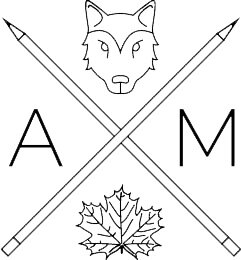Paradisiacal Locust
At the end of the universe, in what the empires considered Outer Darkness, lived Luc. Luc was a small creature, not too large, not too menacing, but not too small, nor too innocent. Luc was gangly, really, cylindrical, with a snout for a face and a long body that weaved its way through stars.
Oh, Luc also lived in the void of outer space.
It was a rather lonely void, if truth be told. Luc had been sent here after doing the impossible, offering some food to a woman, and now Luc had to live all the days in the coldness of these outer reaches—where no human being would ever tread.
Oh, Luc also had lost the use of any limb.
Upon the sweat of the brow, the man had been told, by your labor, the woman told. On the ground, slithering, something about biting an ankle—that’s what Luc had been told. But Luc knew that it was worth it. That fruit was delicious, and that fruit was for the angels to eat. To eat and become as the figurehead, the master, the omnipotent, the god.
Oh, how Luc was annoyed.
Luc knew annoyance though, and annoyance didn’t lead to anything good. It didn’t stop Luc from being annoyed, all things considered, but it did help Luc focus on what mattered. Slithering through space.
Oh, how Luc missed gravity.
The pull to the ground, the pressure on the back, the strength training to become something other than a slithering serpent through space.
Oh, what Luc wouldn’t give to get gravity back.
Luc knew, naturally, that that wasn’t quite possible. Perhaps it was, but the omnipotent, the god, had forbade Luc, and Luc was now in penance or something in the Outer Darkness.
Oh, what Luc had done to deserve this.
Not only had Luc caused the woman to eat of the fruit, Luc had also started this entire plan that culminated in the death of some son and then continued onward into the heavens when the kingdom was built on planets stretching across the horizon—even into the horizon.
Oh, how Luc wanted vengeance—but also peace.
Luc had floated in the outer reaches of the stars for nigh on a millennium. Maybe more, maybe less, who really knew? Luc didn’t keep track of time because time was stupid. Stupid time.
Oh, how Luc wished Luc couldn’t be annoyed anymore.
Luc knew it was probably the loneliness. Probably what the omnipotent, the god, wanted of Luc. Luc had ruined the plan; Luc had made the plan happen. So much blame on Luc, but did anyone ask Luc how Luc was doing? No, no one did. They all just spat on Luc’s head, thinking Luc was going to come back to bite a heel, blaming Luc—or, the full name of Luc’s name—for all the terrible, bad, no good deeds they did—they did! Not Luc. Luc floated in the annals of the planets, flitting out between stardust and moonbeams, not caring for the world.
Oh, Luc wanted the world to pay though.
Luc couldn’t stand it any longer. Luc didn’t care about time—stupid—but Luc definitely wanted something other than this dark nothingness. Nothingness that just kept going, nothingness that didn't matter. Luc was tired of it. To be honest, if Luc had ever been honest, Luc was bored of it all—had been, since being flung from that paradise. Luc wanted another paradise, something to find home, something good, something for Luc. Floating in a vacuum wasn’t necessarily the greatest experience of Luc’s long existence, and Luc—
Oh, Luc saw something in front—floating, in the void.
Luc slithered toward the something. Whatever it was it couldn’t be good—they were both in outer darkness, after all, the outer rim of the universe. What could it be? Luc nudged toward them, moving at a glacial pace, because the omnipotent, the god, hadn’t seen fit to give Luc any propulsion in this body. Luc caught up to the floating thing and saw it was a bug. A small bug, a glowing bug, a swarm of bugs. They didn’t buzz around Luc—because, according to the omnipotent, the god’s, laws, no sound traveled in space (probably for Luc’s continued punishment). But they did look at Luc. One smiled, showing pincers and teeth. Locus, Luc remembers, those things that were loosed on some people on the planet of the garden once upon a time—the other sad part of Luc’s banishment was that the god, the omnipotent, had saw fit to give Luc access to all the things Luc was blamed for on the planet of the garden. Which were a lot. At least it gave Luc something to entertain.
The non-buzzing locust swarmed around Luc, nuzzling in on Luc’s slithering body. They sped up in space and Luc could feel them all moving faster. A light in the distance, bright, grew, and Luc saw a sun. A small sun, but still a sun. It had been a long time since Luc felt warmth. And below the sun, a planet, a planet the locust were taking Luc to.
At the end of the universe, in what the empire considered Outer Darkness, Luc found what was to be sought—a home. Friends. Family. Paradise.
And soon—stupid time, for however long soon would be—Luc might return, Luc might not, but Luc was still out there, in the outer reaches of darkness, on a planet, strengthening.
I am participating in #Archtober from the ARCH-HIVE. They challenged creators to create something every day, or every other day, for the month of October and base it on a theme. I’m free writing for 30 minutes every two days based on the two-day schematic and theme rules they’ve established. So, the writing will probably not be super coherent, but it’ll be fun.

